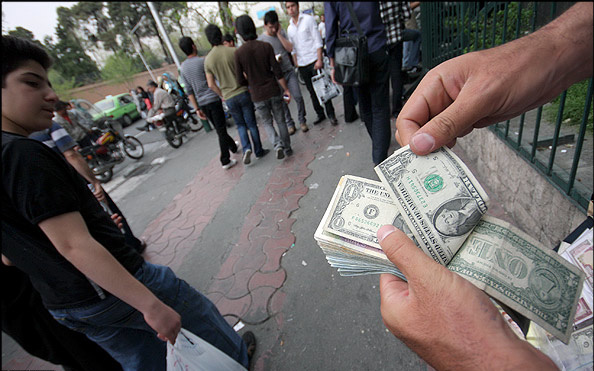One of Iran’s leading ayatollahs has called for the execution of some currency exchange dealers, in a sign of the regime’s concern over the historic fall in the Iranian rial.
Ayatollah Nasser Makarem Shirazi said in Qom:
We have to pay a price if we do not act proactively. We should execute, according to Islamic rules, a few foreign exchange traders who try to plunge the country into chaos, in order to teach a lesson to others.
The rial broke the all-time low of 45,000:1 v. the US dollar last month. The Central Bank raised interest rates and authorities threatened the arrests of speculators and unofficial traders to halt the drop to the symbolic 50,000:1 mark.
However, amid concerns over new US sanctions and Iran’s economic problems, the rial began another slide to more than 60,000:1 on Monday. Some exchange shops have shut, and there are long queues for small amounts of foreign currency from official outlets.
The Rouhani Government’s economic committee has held two emergency meetings since Monday, when it raised the official rate of the rial to 42,000:1, up from 37,000:1.
In a far more difficult step to implement, the Government said it will unify the official and open-market rates. Such a step would require either that authorities open up trading of its foreign currency at the 42,000:1, risking depletion of its reserves with the likely high demand, or it halts the open-market trade at the higher level.
“We do not recognise any other rate,” said 1st Vice-President Eshaq Jahangiri, “Anyone trading at any other rate will be considered a smuggler.”
The Tehran Police Chief, Gen. Hossein Rahimi, said 12 unlicensed dealers were arrested on Tuesday and 16 currency exchange centres have been shut down.
“In a move in coordination with the Central Bank, Iran’s cyberspace police has summoned a group who disrupted the forex market using the Internet and social media,” Rahimi explained.
In a symbolic step, the Government said it will switch from the US dollar to the Euro as the official foreign currency in market reports.
in an effort which could be meant to reign in the rate of the greenback that hit multiple records against the Rial earlier this week.
Valiollah Seif, the governor of the Central Bank of Iran, insisted, “Changing the reporting currency of the country is very serious…This will be reasonable because it will have a primary effect on the economy.”
However, the move is more psychological than practical, hoping to draw attention away from the standard marker of the rial v. the dollar, with the 50,000:1 and 60,000:1 rates broken.
The Government has also announced that the possession of more than ten thousand Euros or its equivalent in any other foreign currency would be a criminal offense.
But Iranian State outlet Press TV points to issues with implementation, writing that currency exchanges “still had to wait for new supplies of the greenback to be injected into the market”.
The site said this will not happen before Wednesday – the last trading day of the Iranian week – or Saturday.


“We have to pay a price if we do not act proactively. We should execute, according to Islamic rules, a few foreign exchange traders who try to plunge the country into chaos, in order to teach a lesson to others.”
This really tells it all about the 40 year rule of illiterate mullah bastards. As if taking every breadth out of people has served the country so well, lets make it even more savage . But this mullah should keep in mind, when that time comes, declarations like this will come back to bite him in the ass.